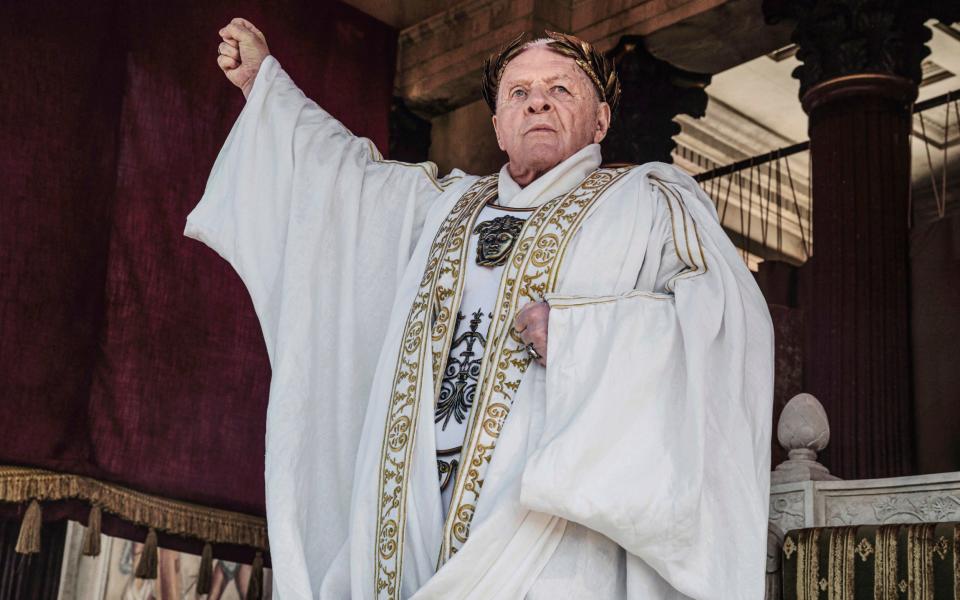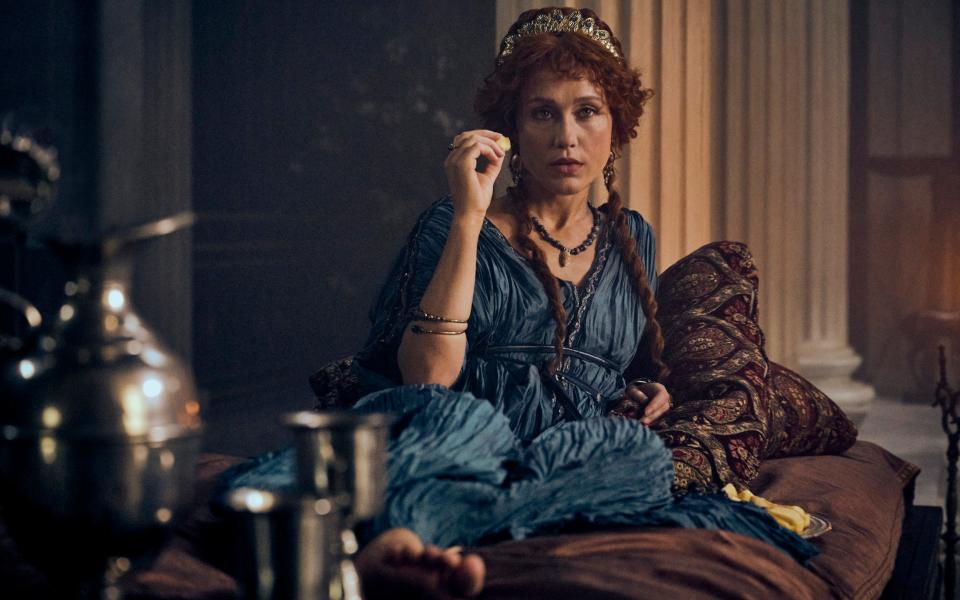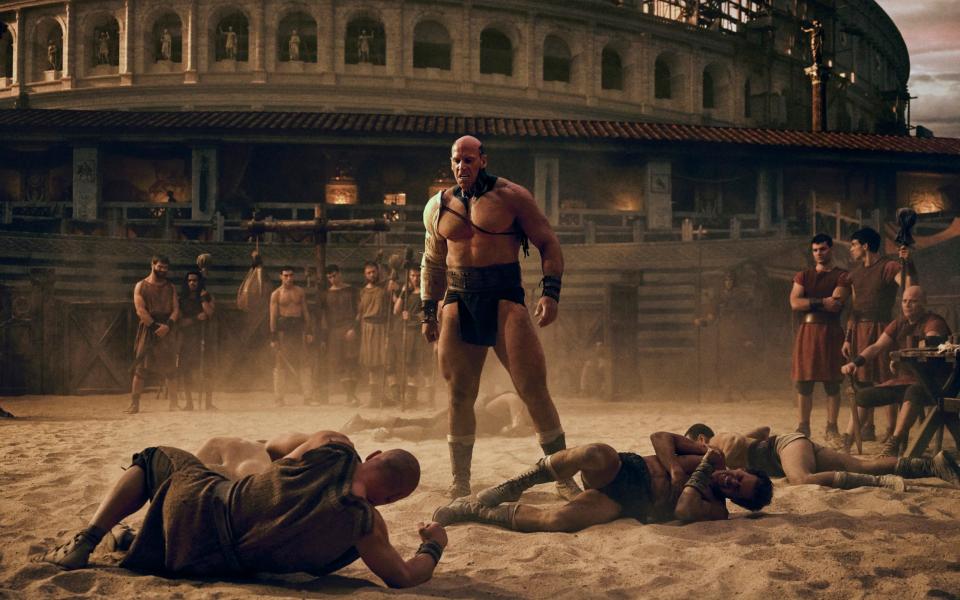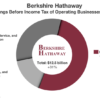‘The world has always been a place of total chaos,” shrugs Anthony Hopkins, quite cheerfully. “Whenever I hear politicians saying, ‘Let me be clear…’, I think: well, where is the clarity? They say nothing new, on either side. We watch, hypnotised, as they fumble around. They’re only human beings, after all. We’re all going down into the swamp. There’s no way out.”
The 86-year-old actor – who was knighted by Queen Elizabeth II in 1993, but still prefers to be addressed as “Tony” – is speaking via video link from his Los Angeles home, the day after the disastrous televised debate between Joe Biden and Donald Trump. He didn’t watch it, but he chuckles when I tell him that Poland’s foreign minister was, apparently, inspired by the discussion to compare America’s 2024 presidential election campaign with the decline of the Roman Empire. The latter is a subject very much on Hopkins’s mind: he’s about to be seen in his first TV role since Westworld in 2018, playing Emperor Vespasian in Roland Emmerich’s lavish sword-and-sandal series Those About to Die.
Based on the 1958 book of the same name by Daniel P Mannix (which previously served as the original inspiration for the Gladiator screenwriter David Franzoni), the series explores the ways in which Vespasian sought to restore order to Rome after the city had burnt almost to the ground during Nero’s deranged and decadent rule. Nero, who killed his mother and is believed to have kicked his pregnant wife Poppaea to death, before castrating and marrying a boy who resembled her, took his own life in AD 68. Vespasian, one of Nero’s former generals, took charge of the empire the following year and began the vast project of rebuilding Rome.
On the site of Nero’s former palace, Vespasian built the great amphitheatre we now know as the Colosseum, to host gladiator fighting, public executions and other brutal “entertainments”. On one level, in building the Colosseum, Vespasian – the first emperor to rise to power from the middle-ranking equestrian class – was making a gesture in support of the Roman people. However, the seating in his grand new amphitheatre, divided along class lines, served only to reinforce the strict social hierarchy; and there is more than a suggestion that the spectaculars staged there were above all a cynical means of distracting the masses from bigger concerns.
“Bread and circuses, hey? Look this way!” says Hopkins. “It was the same as in today’s political climate, where you have nothing but distractions. The movie industry, the red carpet… entertainment, entertainment, entertainment. You can get too many films now. Fluff! And you are hooked. It takes you away from the pain of living in political chaos.”

You might well wonder if Those About to Die is exactly the kind of lavish escapism that Hopkins is talking about. Later, I ask Emmerich – the German-born blockbuster merchant, best known for disaster movies such as Independence Day and The Day After Tomorrow – if it’s true, as one report has suggested, that he was handed a total budget of $140 million (£111 million) for the first 10 episodes.
“It cost, I think, more than that,” he grins, perched on a leather sofa at home in Munich. “But we got a 40 per cent tax rebate by filming in Italy, which made it all possible. And you must remember that Ridley Scott gets $250 million for one film,” he adds, referring to the British director’s forthcoming sequel to Gladiator. “I spent $100 million less on 10 hours, so I think you get a good deal.”
No small share of the money went on state-of-the-art computer-generated special effects, which make viewers feel as though they are chasing horse-drawn chariots around the tightest bends of the arena, whereas what they are actually watching is actors standing in static carts while lowly crew members rattle the axles and waggle the reins. “Most of the animals are CGI, because Peta [the non-profit organisation People for the Ethical Treatment of Animals] wouldn’t let you treat them that way on set,” says Emmerich. “But they’re incredibly lifelike, aren’t they? I do like the horses and lions, but the crocodiles were my favourites – they get such a deadly look in their eyes…”
For fans of ancient Roman adventures, from Spartacus to Gladiator, this may all sound like well-trodden territory. “I know we’ve seen Rome on screen many times before,” Emmerich concedes. “But when I read Mannix’s book five years ago, I realised this particular story had been missing: the story of how politics was played out in the blood and sand of the amphitheatre. So, yes, we’d had Ridley Scott’s Gladiator, but that was the story of one special man, rather than the whole dynamic…”
In Emmerich’s telling, we get to see how every political faction backs a different charioteering team, each distinguished by colour, like modern football teams. Each team’s fortunes rise and fall on the amount they’re prepared to invest in the best horses and drivers – or, if they are willing to allow their dignity to take a hit in the arena, they can bet against themselves and rake in the gold behind the scenes. There are dirty tricks, too: horses poisoned, charioteers jumped in dark alleys and chariots hobbled.
Gazing down on the action from the imperial balcony – the power of life and death in a twist of his wrist – stands the ailing Vespasian. Hopkins has some admiration for the man. He jokes that, during his own schooldays, he wasn’t much of a classicist – “I tried to read Gibbon’s Decline and Fall [of the Roman Empire]. Impossible! So I had to get ‘Gibbon for simpletons’” – but he evidently now has a solid grip on his character.
“Vespasian was, I think, a strong soldier, a man of justice determined to make Rome a decent place after Nero had left it in a mess of backstabbing and all of that. Awful. The place was in its death throes. So he came along and said, right, let’s put it back on track. He was a pragmatist. He knuckled down to fiscal reforms and acts of consolidation. He had two sons and told them to behave, to get on with it. But their dynamic was always going to unleash the scorpions of jealousy.”
A possibly apocryphal account of Vespasian’s final hours has him insisting on remaining on his feet even as the life drains out of him, before delivering his final words: “I think I am becoming a god.” Did Hopkins feel at all godlike in the role? “Oh, yes!” Does his huge social-media following (more than five million on Instagram alone) make him feel similarly powerful? “Power?” he splutters. “No. What I do have is usefulness. I hope I can make people feel a little better.

“Did you see the video I posted of me dancing with Ian?” he asks, referring to a recent post in which he and Ian McKellen (who was injured last month after falling off a West End stage during a performance) can be seen whirling around a sunlit room in matching jackets, exchanging pecks on the cheek. “I’d heard about his fall and I thought he needed cheering up. We’re both in our 80s – I’m a year older – and I think it helps to give people a little bit of fun, to show it’s not over till its over. Just get on with it. Enjoy it.” Having said that, he notes, “I did FaceTime Ian the other day, though. Because he still goes on stage.” Hopkins hasn’t trodden the boards since 1989. “I said I think he should show a little caution, a little moderation now, because he’s crazy!”
In Those About to Die, Hopkins’s performance crackles with the electricity of supreme power. When he narrows his eyes to assess his sons, or lifts gold coins to their noses and asks them to describe the smell of money, I’m reminded that when Laurence Olivier first saw the younger actor on stage, he compared him to “a cat with a mouse between its teeth”.
Those who know him best for his more predatory roles, above all his Oscar-winning turn as the sadistic serial killer Hannibal Lecter in 1991’s The Silence of the Lambs, won’t be surprised by that description. But the chilling, even sociopathic intellect he can project on screen is even more disquieting once you’ve met him in person. In the short time we spend talking, Hopkins, who is as interested in asking questions as answering them, makes me feel like an old friend.
He asks where I live – “Oh, I did A Winter’s Tale just down the road from you, in Hornchurch, in the mid-1960s” – and reacts with delight when my cat leaps in front of my computer camera. “Oh! What’s his name? He’s having a lovely time, isn’t he?” Since quitting drinking in 1975, Hopkins has often said that his four great pleasures in life are a book, a piano, a cup of tea and a cat.

Such temperate pleasures do not feature in Those About to Die, which shows about as much restraint as you’d expect from a director famous for filming the obliteration of New York City by aliens. Instead, there are bloodsports, booze and sex from the off. As the camera sweeps into the amphitheatre at the beginning of the first episode, we’re greeted by three prostitutes. “I’m tight,” boasts the first, one breast bared. “I’m tighter,” pitches a second. “And I’m tighter than both!” winks the boy behind them.
Emmerich was keen to show that “the Romans were sexually much freer than us” – and those critics who sigh at the operatic excesses of his “popcorn movies” are bound to roll their eyes at all the jiggling bottoms he packs into the new series. In fact, he tells me, he was holding back. “I couldn’t show Rome to be as devious and sexually charged as it really was because there are limits imposed by the streamers. Everybody wants to have a naked woman – boobs and more boobs – but…” he leaves the thought unfinished.
Emmerich is one of Hollywood’s most successful gay directors. I ask if it bothers him that the show’s more morally decent characters are all ostensibly straight, while the main villain, Domitian – played by the Sex Education actor Jojo Macari – is only shown with his gay lover. “Yes! I always like to go more to the edge of things and I always put a lot of gay characters in my movies,” he says. “But when I was in Italy, it was quite interesting how they reacted to the idea of a character being openly gay. Italy is a Catholic country and you feel that… there is this little resentment, you know?”

When I tell Emmerich that Hopkins shrugged off the challenge of playing Vespasian as “easy”, he laughs. “It’s not at all like that with him. He’s very thoughtful. He comes with endless notes on his script. His Colombian wife is always protecting him.” Hopkins has been married to Stella Arroyave, his third wife, since 2003. “Yes, of course he is this sweet, jolly guy between takes, but then you say ‘Action!’ and he gives these amazing performances.”
Emmerich finds it harder than Hopkins to laugh off the implications of the Biden-Trump debate. “For me, it was a real disaster,” he says. “As you can probably guess, I’m not very hot on Trump, but Biden is obviously sometimes not himself. He was much better at a rally the next day, but to see that was scary.”
Does Emmerich agree with Hopkins that the entertainments of the multiplex – or, thanks to the deep pockets of streamers such as Prime Video and Netflix, the small screen – are the modern equivalent of the Circus Maximus? “Oh, yes. Nobody dies, but it’s still entertainment. In a way, that’s the same.”
Emmerich tells me he had to brush off his historical advisers while making the series because he was, as ever, keen to prioritise grabbing the audience’s attention over historical accuracy. He nods when I tell him that a friend of mine who suffers from anxiety says she feels better when watching the kind of disaster movies he makes, because they normalise her state of extreme tension.
“Oh, yeah, I am not surprised,” he says. “I have the feeling it is all happening again. I would have thought we would have learnt something.” Instead, we’re making boxsets as Rome burns? “Exactly!”
Those About to Die is on Prime Video from July 19
EMEA Tribune is not involved in this news article, it is taken from our partners and or from the News Agencies. Copyright and Credit go to the News Agencies, email news@emeatribune.com Follow our WhatsApp verified Channel





